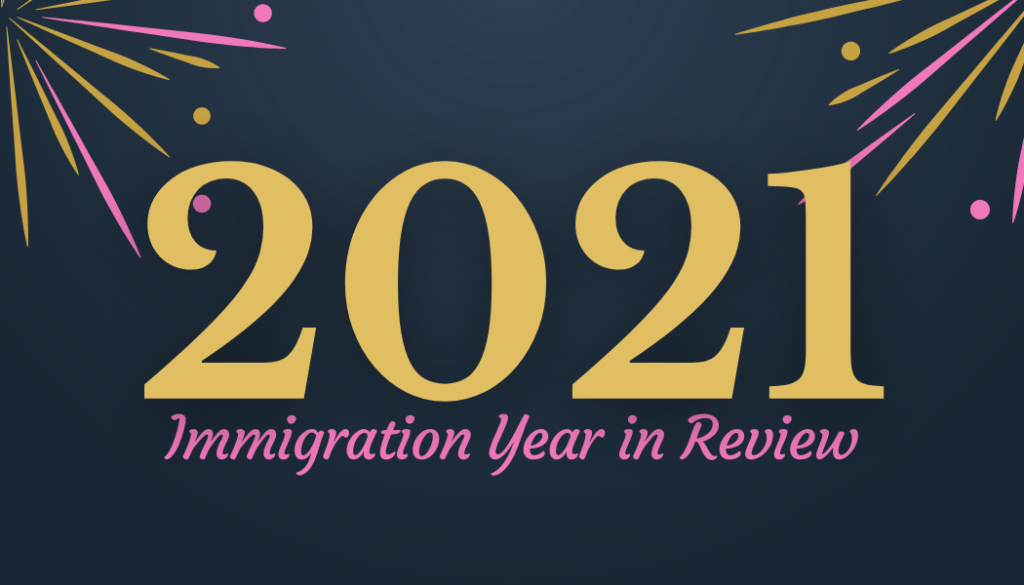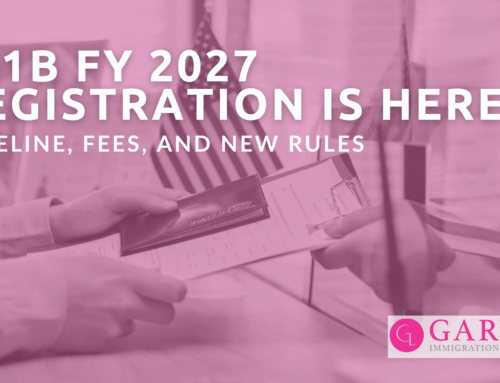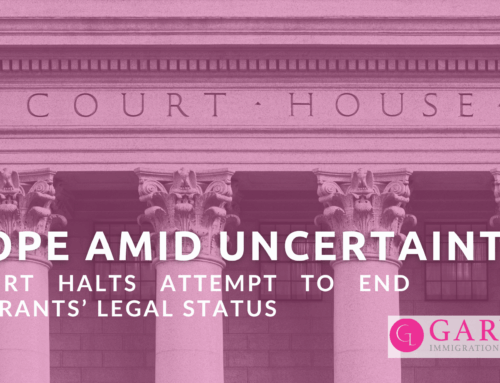 2021 was a challenging year in immigration and a busy year for immigration news and updates. Here are some of the key changes and updates to U.S. immigration law and policies that will impact business and family immigration in 2022, and for years to come. Some of these new programs and policies will continue to change in 2022. Contact Garvish Immigration Law Group for complete and current immigration policies at 1.800.951.4980.
2021 was a challenging year in immigration and a busy year for immigration news and updates. Here are some of the key changes and updates to U.S. immigration law and policies that will impact business and family immigration in 2022, and for years to come. Some of these new programs and policies will continue to change in 2022. Contact Garvish Immigration Law Group for complete and current immigration policies at 1.800.951.4980.
Presidential Proclamations, Executive Orders, Proposals and Rescissions
- On January 20, 2021, President Biden issued a memorandum declaring a freeze on the federal agency regulatory process for the Trump administration regulations that have not yet taken effect or been finalized.
- On January 20, President Biden issued a memorandum directing the Secretary of Homeland Security, together with the Attorney General, to take actions to preserve and fortify the Deferred Action for Childhood Arrivals (DACA) program.
- On February 4, the 2021 Dream Act was proposed to allow qualified persons brought to the U.S. as children (Dreamers) with a path to conditional residency, permanent residency and citizenship.
- February 18, the U.S. Citizenship Act of 2021 was introduced in the House “to provide an earned path to citizenship, to address the root causes of migration and responsibly manage the southern border, and to reform the immigrant visa system, and for other purposes.” The same bill was introduced in the Senate on February 22.
- On February 22, USCIS announced it is reverting to the 2008 version of the naturalization civics test beginning March 1, 2021.
- On February 24, President Biden revoked Presidential Proclamation 10014 which prohibited the issuance of certain immigrant visas at the U.S. Embassies abroad.
- On March 8, DHS withdrew the Affidavit of Support’ proposed rule would have changed the requirements for U.S. citizens, U.S. nationals, and lawful permanent residents to sponsor an individual immigrating to the U.S.
- On March 9, DHS removed the Trump administration’s Public Charge Rule that classified foreign nationals as a “public charge” if they had received one or more public benefits.
- May 11, DHS announced plans to continue the International Entrepreneur Parole Program.
COVID and Pandemic Temporary Updates
- Effective on December 31, 2021, the White House announced it will lift travel restrictions on eight southern African countries including South Africa, Botswana, Eswatini, Namibia, Lesotho, Malawi, Mozambique and Zimbabwe.
- Travel and immigration from 8 countries were suspended effective November 29 where the Omicron variant has been detected. Other travel bans implemented due to the pandemic had already been suspended.
- Effective December 9, the immigration 60-day medical exam rule has been waived through September 30, 2022, to help applicants affected by pandemic-related processing delays.
- USCIS extended the validity of the I-693 Medical Exam from two years to four years in August to help expedite processing delays due to the pandemic.
- Re-opened international travel on November 8 for non-citizen, non-immigrant air travelers to the United States if they are fully vaccinated and can provide proof of vaccination status prior to boarding an airplane to fly to the U.S.
- Effective October 1, 2021, green card applicants must be fully vaccinated against Covid-19 in order to pass the medical exam.
- In June, USCIS issued new policies to expedite the processing of employment authorization documents (EAD), requests for evidence (RFE) and notices of intent to deny (NOID) due to processing delays caused by the pandemic.
- In May 2021, USCIS suspended biometric submission requirements for certain filings through May 17, 2023.
- April 27, 2021, the Biden administration reinstated the employer-friendly Deference Policy where USCIS officers have to give deference to prior employment visa determinations of eligibility when extension requests involve the same employer, employee and employment terms as the initial petition or application. The 2004 Deference Policy had been revoked by the Trump administration.
- Effective April 2021, employer inspection of I-9 forms only applies to employees who report to work on a regular, consistent or predictable basis.
- On March 12, USCIS announced it can reopen H-1B petition denials that were based on 3 USCIS policies that were later rescinded.
- USCIS extended flexibility for responding to agency requests on notices or decisions issued between March 1, 2020, and January 15, 2022.
H-1B Visas
- In-person visa interviews for H-1B, student and other non-immigrant work visas were temporarily waived on December 23, 2021, through December 31, 2022, due to the immigration backlog caused by the pandemic.
- In September 2021, a court ruled that Chad Wolf was not the lawful Acting Secretary of Homeland Security when DHS issued the H-1B lottery prioritization rule that would have changed the H-1B selection process from a random lottery-based selection to a wage-based process.
Remain in Mexico Policy
- Overruling the Biden administration’s suspension of the Migrant Protection Protocols (MPP, or Remain in Mexico Policy), under court order and under a new agreement with the Mexican government; Remain in Mexico went back into effect on December 6, 2021.
Spousal Visas
- On November 12, 2021, USCIS issued a new Policy Guidance that allows automatic extensions of employment authorization for certain H-4, E, and L non-immigrant dependent spouses in the settlement of a class-action lawsuit.
Eligibility for H-2A and H-2B Visa Programs
- DHS added new countries that are eligible for H-2A and H-2B Visa Programs: Bosnia and Herzegovina, the Republic of Cyprus, the Dominican Republic (currently only eligible for the H-2A program), Haiti, Mauritius, and Saint Lucia.
- Moldova is no longer eligible for the H-2A visa program after January 18, 2022.
Temporary Protected Status
- In October, President Biden extended Temporary Protected Status for immigrants into 2022 and beyond for eligible immigrants from nine nations: El Salvador, Haiti, Honduras, Nepal, Nicaragua, Somalia, Sudan, Syria and Yemen.
- In March, Venezuela was given Temporary Protected Status (TPS) for 18 months, until September 2022.
While many immigration changes were made in 2021, we can expect many more immigration changes in 2022, including legislative activity to preserve President Biden’s key Build Back Better Act.
Follow Garvish Law on social media to stay updated on changes that occur throughout 2022!
Sign-up for Garvish Immigration Law Group’s email newsletters



